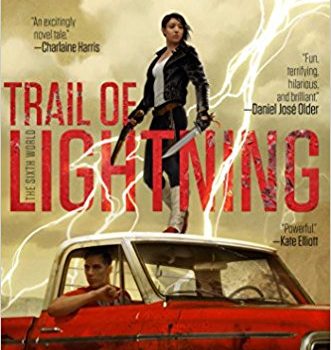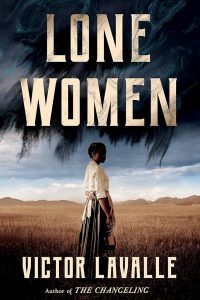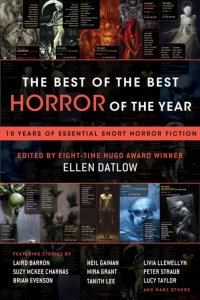Liz Bourke reviews Trail of Lightning by Rebecca Roanhorse
 Trail of Lightning, Rebecca Roanhorse (Saga Press 978-1534413498, $27.99, 304pp, hc). June 2018.
Trail of Lightning, Rebecca Roanhorse (Saga Press 978-1534413498, $27.99, 304pp, hc). June 2018.
Like many of this year’s debuts, Rebecca Roanhorse’s Trail of Lightning has a great deal of anticipatory hype to live up to. A fantasy published by a major press that features Native American mythology, written by a Native author, Trail of Lightning carries a weight of expectations for representation that most works by (non-queer, at least) white authors never bear. As a white and Irish reader, I’m in no position to pass comment on whether or not it will speak to a Native audience – but if its reception has anything in common with that of good queer SFF among a queer SFF readership, it will likely be equal parts fraught and gleefully ecstatic. Roanhorse has been nominated for a Nebula and a Hugo for her short story ‘‘Welcome to Your Authentic Indian Experience’’ (Apex, 2017), and for the John W. Campbell Award for Best New Writer, and we can look forward to seeing more novel-length work from her: Race to the Sun, a novel for younger readers, is due in 2019 from Rick Riordan’s new children’s imprint, and a sequel to Trail of Lightning is to be expected from Saga next year, too. So what is Trail of Lightning all about?
When the USA still existed as a country, Dinétah was known as the Navajo reservation. But the world outside Dinétah has undergone political, social, and environmental collapse thanks to a great flood. Dinétah remains. Preternatural walls surround it, and the Diné, or several individuals among them, have come into preternatural powers linked to their lineages. Dinétah is home to gods and monsters as well as humans, and its patchwork of small towns and local villages is isolated, in large part by choice, from the outside world.
Maggie Hoskie isn’t isolated by choice, but by upbringing. Her lineage powers connect her to hunting and killing, and after the brutal death of her grandmother, she was trained and raised by Naayééʼ Neizghání, a part-divine monsterslayer. Maggie is known as a monster hunter, but her mentor abandoned her, and she’s been isolated from the one person she loved and trusted ever since – even if Neizghání seems an unhealthy choice of father-figure/romantic attraction, one who kept telling her that she was pretty close to being a monster herself.
Recruited to kill a monster that’s abducted a small child, Maggie finds herself pushed into the middle of trouble. The monster is unusual, and there’s more to it than she expected: it was made by a person. She joins forces with unconventional medicine man Kai Arviso, a young man who grew up mostly outside the borders of Dinétah and who has strange friends, and she finds herself a) in the midst of violence, b) with Coyote asking her to do a job for him, and c) headed for a brutal confrontation with her past.
The post-apocalyptic-with-magic world and urban fantasy feel, combined with the socially isolated, highly murder-trained protagonist with a first-person voice reminds me a little of Ilona Andrews’ Kate Daniels series, though Roanhorse of course doesn’t make Andrews’s use of urban fantasy staples such as vampires and werewolves, nor does she use the by-now formulaic type of romance common in urban fantasy. The use of Native American mythology makes the worldbuilding stand out from the crowd, and while Roanhorse’s characterisation at times feels a little shallow, the novel’s voice is pretty damn compelling.
Structurally, it’s not as smooth as I was hoping: on occasion it seems that incidents pile on each other without quite as much thematic and emotional linkage – or sometimes, explanatory connective tissue – as one might really prefer. But it’s tense and pacey, and, although the dialogue is rarely particularly memorable, the interplay between Maggie and Kai is frequently entertaining.
This is a fun, fast book, immensely readable and very enjoyable. It ends with tense emotion, and a cliffhanger for a sequel: I look forward to seeing how Roanhorse builds on this very promising debut. We can, I think, expect good things.
Liz Bourke is a cranky queer person who reads books. She holds a Ph.D in Classics from Trinity College, Dublin. Her first book, Sleeping With Monsters, a collection of reviews and criticism, is out now from Aqueduct Press. Find her at her blog, her Patreon, or Twitter. She supports the work of the Irish Refugee Council and the Abortion Rights Campaign.
This review and more like it in the June 2018 issue of Locus.
 While you are here, please take a moment to support Locus with a one-time or recurring donation. We rely on reader donations to keep the magazine and site going, and would like to keep the site paywall free, but WE NEED YOUR FINANCIAL SUPPORT to continue quality coverage of the science fiction and fantasy field.
While you are here, please take a moment to support Locus with a one-time or recurring donation. We rely on reader donations to keep the magazine and site going, and would like to keep the site paywall free, but WE NEED YOUR FINANCIAL SUPPORT to continue quality coverage of the science fiction and fantasy field.






